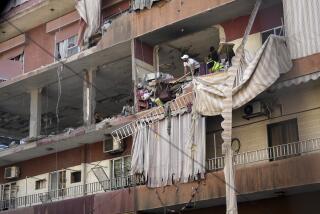Time Isn’t on America’s Side
- Share via
The three-way bargaining game that pits the United States against Iraq -- with the United Nations in the middle -- has not ended but rather intensified with Saddam Hussein’s early acceptance of the intrusive U.N. inspection regime. We should expect further bold moves by Hussein in an effort to delay and deter an American-led war on Iraq.
Make no mistake: Time is on Hussein’s side. If he succeeds in pushing off U.S. military action beyond the “winter window” for war, U.N. resolve could weaken (for instance, when Germany assumes the presidency of the Security Council in February); U.S. attention could shift (with another major Al Qaeda terrorist attack in the U.S.); or the Israeli-Palestinian conflict could explode into war (after the January Israeli election).
Like Mr. Micawber, the Charles Dickens character in “David Copperfield,” Hussein’s hope is that “something will turn up.”
As recently as two weeks ago, Washington insiders predicted an 80% chance of war against Iraq by next spring. After the Bush administration’s victory in the Security Council and Iraq’s response, those odds now drop to 50-50.
The Security Council specified a precise timetable against which Hussein’s mice will seek to elude the U.N. cats as an ominous American presence hovers over both.
By Dec. 8, Hussein must declare all weapons of mass destruction in Iraq. At that point, chief U.N. inspector Hans Blix should have “immediate, unimpeded, unconditional and unrestricted” access to any site in the country.
U.N. inspection teams must begin work by Dec. 23 and report their findings to the Security Council no later than Feb. 21.
No one in Washington or Baghdad can say with certainty how this deadly game will end. If Hussein concludes that his only hope of survival in power is to surrender his weapons of mass destruction, he could yield to the U.N. inspection regime, to the amazement and indeed consternation of hawks in the Bush administration. Or Hussein could stiff U.N. inspectors so blatantly that even his strongest supporters in the Arab world would abandon him. More likely, however, is a fuzzy middle road in which Hussein seeks to do as little as he can get away with in an attempt to postpone war beyond the current season.
Should he prove sufficiently cooperative by declaring some weapons facilities that inspectors could confirm and dismantle, U.N. inspection teams could extend their work into next summer.
If war is postponed, how should the parties use this unexpected hiatus? Surely Hussein will not change his spots. We should expect him to accelerate his plans to unleash a plague of horrors if and when we do attack.
Preparing to fight a war that could start in January or be delayed until the following winter would stress American military services, requiring them to keep substantial forces and equipment at a high level of readiness.
Nonetheless, this credible threat of war is the essential prerequisite for any peaceful disarmament of Iraq. As National Security Advisor Condoleezza Rice put it, “We have to keep ... a gun pointed to the head of the Iraqi regime because that’s the only way that they cooperate.” This hiatus also offers an opportunity for the U.S. and our allies to get real about defending ourselves against the retaliatory vengeance Hussein is planning.
Only last week, officials made public a highly classified report revealing the intelligence community’s judgment that Iraq possesses the smallpox virus. Another recently declassified estimate concluded that Hussein would be “likely” to retaliate against an American attack by using chemical and biological weapons against us.
We are not prepared for such an attack. On current timetables, the Department of Health and Human Services will not have enough approved smallpox vaccine for the entire population until late 2003. More important, preparations to vaccinate the population during the four-day window after an initial smallpox attack have hardly begun.
If war against Iraq is postponed, most Americans will breathe a sigh of relief. Unfortunately, such relief is more likely to encourage complacency than vigilant preparation. If the Bush administration finds itself with an unexpected delay in military action, it should seize the opportunity to bolster America’s defense against Hussein’s probable designs.
More to Read
Sign up for Essential California
The most important California stories and recommendations in your inbox every morning.
You may occasionally receive promotional content from the Los Angeles Times.












